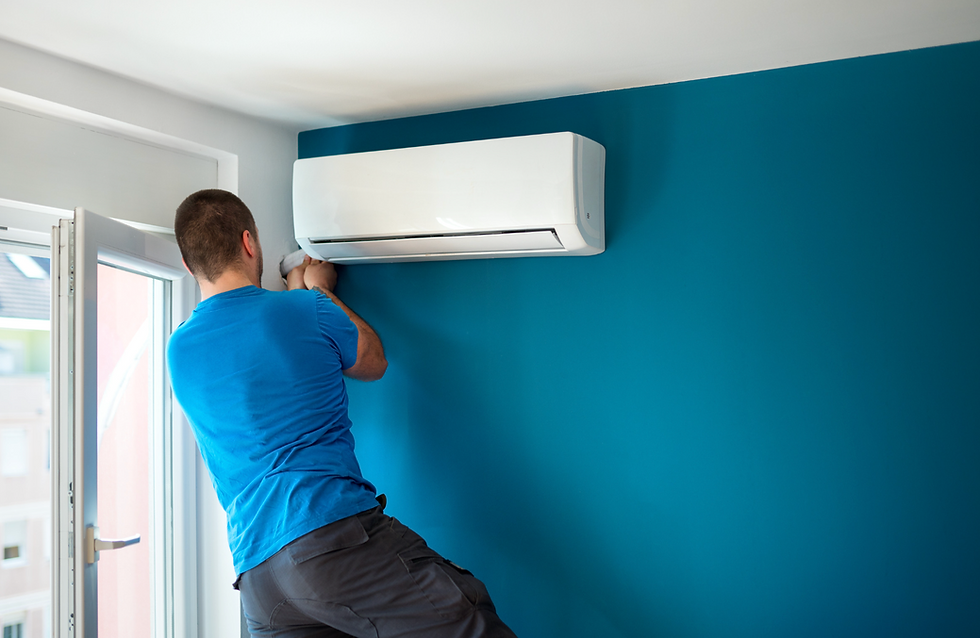Common AC Problems and How to Fix Them
- Rockwall Electric

- Nov 12, 2025
- 4 min read

When your air conditioning system stops performing the way it should, it can quickly make your home uncomfortable and increase your energy costs. Many common AC problems can be avoided or fixed with basic troubleshooting, regular maintenance, and knowing when to call a professional.
Let’s explore the most frequent issues that affect your AC unit and what you can do to keep your home comfortable all year long.
1. AC Blowing Warm Air – Common AC Problems
One of the most common AC problems homeowners face is when the AC is blowing warm air instead of cool. This can happen because of refrigerant leaks, blocked ducts, or issues with the condenser coil. When refrigerant levels drop, your cooling system struggles to create cooled air, forcing the hvac system to work harder.
How to troubleshoot:
Check your thermostat settings to make sure the system is set to “cool.”
If you suspect low refrigerant, call a licensed technician to check for leaks and recharge your system safely.
Clean around the outdoor unit to remove dirt or debris blocking airflow.
2. AC Won’t Turn On
If your AC system refuses to start, it could be a tripped breaker, faulty wiring, or a malfunctioning thermostat. Electrical issues are among the most overlooked common AC problems, but they can quickly escalate if ignored.
How to troubleshoot:
Check the breaker panel for a tripped circuit or blown fuse. Reset if needed.
Verify that your thermostat settings are correct and that the batteries are working.
If your unit still doesn’t start, it’s time to have a professional inspect the electric connections and control board for safety.
3. Weak or Restricted Airflow
Poor airflow from your vents can make your system inefficient and increase your energy cost. This usually points to a clogged air filter, blocked vents, or a failing blower motor. Restricted airflow forces your AC unit to run longer cycles, using more power and decreasing energy efficiency.
How to troubleshoot:
Replace air filters every 1–3 months, depending on your home’s environment.
Check that all vents are open and clear of furniture or rugs.
Have your blower motor checked by a professional if the problem continues.
4. Unusual Noises
Your air conditioning system should operate quietly. Grinding, squealing, or banging sounds usually indicate a mechanical problem. These noises often stem from loose belts, a worn blower motor, or a damaged compressor.
How to troubleshoot:
Turn off the system immediately to prevent further damage.
Call an HVAC expert to locate the source of the noise and make repairs before it leads to system failure.
5. Water Leaks Around the Unit
Water leaks or puddles near your outdoor unit or indoor air handler are never normal. They often come from clogged condensate drains, frozen coils, or issues with the evaporator coil. Over time, these leaks can cause water damage to flooring or walls if not fixed.
How to troubleshoot:
Use a wet/dry vacuum to clear the condensate drains.
Turn off your AC system and allow frozen coils to thaw before restarting.
Have a technician inspect the evaporator coil for clogs or cracks.
6. Strange Smells or Odors
Foul or musty odors coming from your vents can point to refrigerant leaks, mold, or electrical issues. Burning smells can mean overheating wires or failing components within the AC unit.
How to troubleshoot:
Turn off your system and schedule an inspection immediately if you smell anything burning.
Clean or replace filters regularly to avoid trapped debris.
Keep the outdoor unit clear of leaves and moisture buildup to prevent future odors.
7. Increasing Energy Bills
Sudden increases in your energy bill can indicate your HVAC system is losing efficiency. This may be due to refrigerant leaks, dirty coils, or worn components that make your system work harder to produce cooled air.
How to troubleshoot:
Replace filters regularly and clean the condenser coil to improve airflow.
Schedule seasonal maintenance to check for leaks, test refrigerant levels, and optimize performance.
Investing in preventive care helps maintain energy efficiency and extend the life of your equipment.
Preventative Maintenance for Your AC System
The easiest way to avoid common AC problems is with consistent preventative maintenance for your AC system. Regular checkups keep your cooling system in top shape and help catch issues before they become costly.
Maintenance tips:
Change filters regularly: Clean filters improve airflow and system performance.
Clean the outdoor unit: Remove debris and keep the condenser coil area clear for proper ventilation.
Schedule annual inspections: Technicians can identify worn parts, check for leaks, and ensure safe electric connections.
Check refrigerant levels: Low refrigerant can reduce energy efficiency and lead to compressor damage.
Taking these small steps can significantly increase energy performance and lower your energy cost over time. Preventive maintenance also provides greater comfort and peace of mind that your HVAC system will perform when you need it most.
When to Call a Professional for Common AC Problems
Sometimes DIY troubleshooting isn’t enough. If you’ve addressed the basics and your AC system still isn’t cooling efficiently, making noise, or showing water leaks, it’s time to call a professional. Certified technicians have the tools and knowledge to safely handle refrigerant leaks, electrical repairs, or motor replacements.
Professional service can also help prevent water damage, restore energy efficiency, and protect your home from unnecessary wear and tear. By responding quickly to common AC problems, you’ll extend your system’s life, maintain proper cooling, and keep your home comfortable through every season.
Don’t wait until your AC unit breaks down completely. Schedule your inspection, stay proactive, and keep your air conditioning system running smoothly for the long term.






Comments